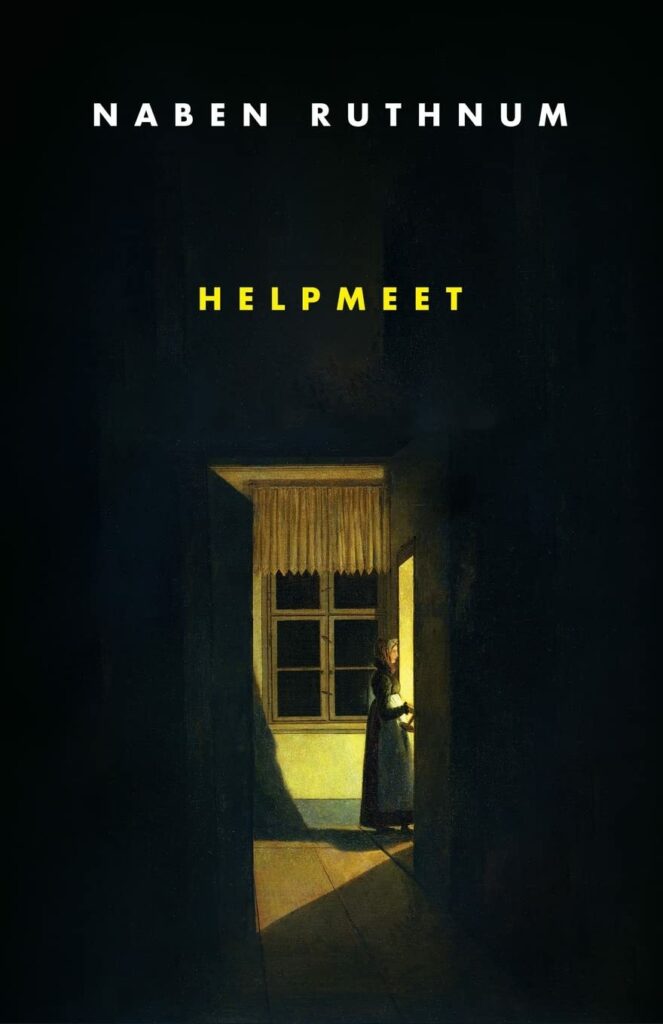Naben Ruthnum’s Helpmeet is a story of possession, but not in the way you’d expect from a work of horror. Rather than ghosts, it confronts readers with the question of what it means to truly possess, to have, someone you love. A slim, beautiful, and disgusting novella of complicated love and even more complicated body horror, in Helpmeet Ruthnum has written an excellent piece of historical weird fiction that manages not to feel like pastiche, more explicitly gory than its forebears would have been, but deeply rooted in the social mores and medical knowledge of the fin de siècle. There’s no room for error in a novella of this length (~88 pages), and the prose and plotting are both tightly controlled and precise, all the fat excised away.

In November 1900, Louise Wilk escorts what’s left of her husband Edward from Manhattan to his childhood home outside of Buffalo. He’s still alive, barely, his body eaten away piece by piece by some inexplicable ailment. Told largely from Louise’s point of view over the night of their departure, the novella roots itself in Ruthnum’s keen eye for human details, anchoring Edward’s decay in both characters’ sumptuous inner lives. The prose, dry and jagged, feels modern, but it’s still clearly a descendent of both the abject horrors of Arthur Machen and the New York society tales of Henry James and Edith Wharton. Helpmeet opens with Louise reflecting on their fall into poverty during Edward’s sickness, but their class differences – a surgeon from a patrician background and a nurse from a family of laborers – have marked their romance from the beginning, what Edward calls an “excommunication of the self” in his slow recusal from polite society. That question of possession reverberates here as well – everyone assumes that Louise is most interested in taking on Edward’s social status, but in fact her love rests not on such bourgeois concerns or even his physical loyalty, but instead loving that she has earned his intellectual/emotional respect and companionship. It’s a sense of devotion outside the bounds of mainstream society; a love unbound by bourgeois conventionality. Their relationship resists easy explanation or pat analysis, but it feels real, as do the characters themselves.
Edward’s infidelity—and Louise’s lack of concern for it—is the most obvious expression of the fascinating biological and religious themes that churn throughout the novella. The former, rather inescapable in a work of body horror, comes to the surface most clearly in the clinical descriptions of his physical rot, but also in the recurring emphasis on bodies entering one another. The echoes of religion are subtler, but there’s something of a reversal of original sin in Louise and Edward’s circumstances –Edward’s doom was brought on by his promiscuity (a rarity for a male character), the initial sign of his infection a scab on his penis that leaves his genitals “an opening that never sealed.” Louise, on the other hand, nobly sacrifices her time and energy to care for him, ably shepherding the dissolution of his body as he spends less and less time lucid and autonomous. That his family home is an apple orchard, producer of a unique cultivar, and that the woman who infected him initially claims the biologically-resonant name Jean, helps to cement the relationship. A lesser author would have made too much of the competition between the two women to understand and control Edward. Ruthnum redirects these questions of ownership and physicality in the novella’s climax, a truly shocking development which first struck me as needing some additional foreshadowing or grounding. On further reflection, I think that would have robbed it of much of its power, and the denouement is certainly fully grounded in the text.
Helpmeet is a remarkable achievement, a novella that manages to feel simultaneously traditional and modern and lingers in the reader’s mind long after its scant pages are over. Remarkably, Ruthnum’s other recent works include thrillers, a corporate satire, and a nonfiction cultural study of curry, but we can hope he’ll be returning to weird fiction often.
Zachary Gillan
Zachary Gillan is a critic residing in Durham, North Carolina. He blogs infrequently at https://doomsdayer.wordpress.com/ and tweets somewhat more frequently at @robop_style. His reviews have appeared in Strange Horizons and Ancillary Review of Books, where he’s also an editor.
